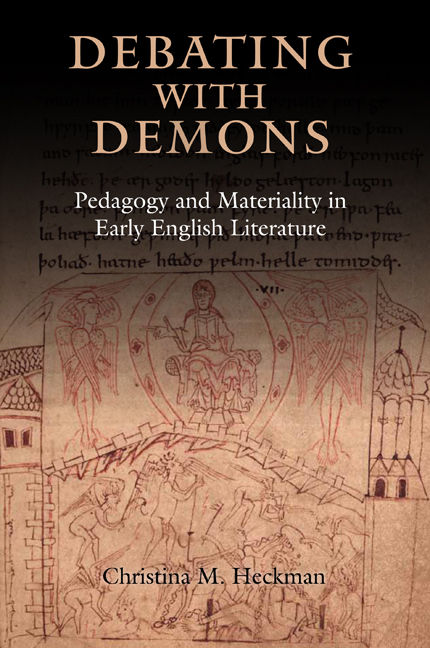Book contents
- Frotmatter
- Dedication
- Contents
- Introduction: The Devil’s Secret Chamber
- Part I Foundations
- 1 Spirituo-Materiality in the Early Middle Ages
- 2 The Artes Liberales in the Early Middle Ages
- 3 The Devil Within: Perils of Pedagogy in the Monastic School
- Part II The Demonic Magister in Early English Poetry
- 4 The Origin of the Teaching Demon: Lucifer as Magister
- 5 Demonic Teaching and the Fall in the Old English Genesis
- 6 Demonic Teaching and Saintly Discretio in Cynewulf’s Juliana
- 7 Inventing Materia: The True Cross and Saintly Disputation in Cynewulf’s Elene
- Conclusion: The Mysteries of Pedagogy
- Bibliography
- Index
- Acknowledgments
- Anglo-Saxon Studies
1 - Spirituo-Materiality in the Early Middle Ages
Published online by Cambridge University Press: 06 October 2020
- Frotmatter
- Dedication
- Contents
- Introduction: The Devil’s Secret Chamber
- Part I Foundations
- 1 Spirituo-Materiality in the Early Middle Ages
- 2 The Artes Liberales in the Early Middle Ages
- 3 The Devil Within: Perils of Pedagogy in the Monastic School
- Part II The Demonic Magister in Early English Poetry
- 4 The Origin of the Teaching Demon: Lucifer as Magister
- 5 Demonic Teaching and the Fall in the Old English Genesis
- 6 Demonic Teaching and Saintly Discretio in Cynewulf’s Juliana
- 7 Inventing Materia: The True Cross and Saintly Disputation in Cynewulf’s Elene
- Conclusion: The Mysteries of Pedagogy
- Bibliography
- Index
- Acknowledgments
- Anglo-Saxon Studies
Summary
An examination of early English teaching demons must begin with understanding how materiality and spirituality interact within an early medieval cultural context, producing onto-epistemological effects. Such an understanding requires moving back beyond the Cartesian divide to imagine what materia reintegrated with spiritus might look like. This chapter, therefore, surveys both early medieval and modern concepts of materiality, foregrounding especially the recent work of scholars in religious studies and medieval studies. These scholars lay the groundwork for an understanding of medieval language, literature, and culture that acknowledges the co-emergence of spirituality and materiality.
Ennobling matter through its integration with spirituality is the mystery at the heart of Christianity, as the divine becomes embodied, uniting eternity and immortality with mortal flesh. The fusion of the material-intellectual- spiritual with the ontological and epistemological is foregrounded in many tales of late antiquity and the early Middle Ages. The pedagogical narratives of teaching demons, though perverse and destructive, actually echo and reinforce the integration inherent in the doctrines and practices relating to the Trinity, the Incarnation, the Eucharist, the other sacraments, and the cults of the saints. The spirituo-material dynamics of early medieval culture, addressed on its own terms rather than through the Cartesian dichotomies that have driven modern and postmodern conceptions of matter, emerge clearly in demonic narratives and in the frequently dissenting responses of the pupils who engage with infernal ‘teachers.’ Within these pedagogical dialogues, matter is created by God and is therefore alive and blessed, infused with spirit even in its potential to decay and fall into weakness. The relationship of the material to the non-material – the physical, the spiritual, the ineffable, the wondrous, as well as the places in which these forces interact – is very much at stake in the claims advanced in demons’ encounters with their pupils. Matter and its meaning are negotiated partly through the pedagogical relationship itself, a fundamentally unstable interchange in which authority can be simultaneously asserted by the demonic magister and resisted by his pupil.
Elucidating this relationship requires the definition of fundamental concepts underlying the teaching of early English poetic demons. These concepts include early medieval understandings of materia and substantia, examined in connection to distinctly English views of the integrated soul, spirit, mind, and body.
- Type
- Chapter
- Information
- Debating with DemonsPedagogy and Materiality in Early English Literature, pp. 15 - 43Publisher: Boydell & BrewerPrint publication year: 2020



